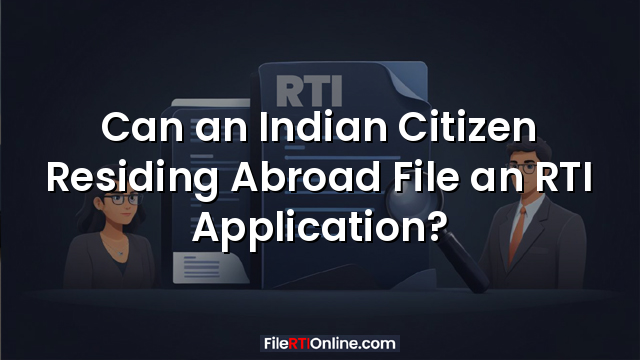The Right to Information (RTI) Act, 2005 grants every citizen of India the right to seek information from public authorities. A recurring question many non-resident Indians (NRIs) ask is whether they can file RTI applications while residing outside India.
A recent case before the Central Information Commission (CIC) provides clarity on this issue and dispels misconceptions.
Background of the Case
An Associate Professor of the National University of Educational Planning & Administration (NUEPA), who was temporarily residing in the United Kingdom, filed an RTI application seeking details regarding the extension of her probation.
The Public Information Officer (PIO) responded that:
- The RTI Act extends only within India.
- Since she was residing in the UK, she should route the RTI application through the Indian Embassy.
- The application was disposed of on that basis.
When she later returned to India and filed a first appeal, the First Appellate Authority (FAA) dismissed it due to an inordinate delay of 16 months.
CIC’s Observations
The CIC examined two separate issues:
1. Whether an Indian citizen abroad must route the RTI through the Indian Embassy
The Commission clarified that:
- There is no provision in the RTI Act requiring Indian citizens abroad to file RTI applications through Indian Embassies.
- The PIO’s refusal to entertain the RTI on this ground was not legally justified.
2. Whether the delay in filing the first appeal could be condoned
The CIC referred to the proviso to Section 19(2) of the RTI Act, which empowers the FAA to condone delay if the appellant shows “sufficient cause.”
The Commission noted:
- The FAA did not examine whether sufficient cause existed.
- The FAA only focused on the delay without reviewing the PIO’s unjustified stance on embassy routing.
- The FAA’s order was incomplete and lacked proper reasoning.
Final Direction
The CIC directed the FAA to revisit the matter and pass a fresh, legally sound order.
Key Takeaways for NRIs
This case clarifies an important principle:
1. RTI applications can be filed from abroad.
Physical presence in India is not required. The only requirement is Indian citizenship.
2. There is no mandatory rule to file RTI through Indian Embassies.
An embassy route is only an option, not a legal requirement.
3. Applications can be submitted through:
- Email (if the public authority accepts)
- Online RTI portals of applicable ministries or departments
- , directly to the PIO
- Through a representative or friend in India (not mandatory, but allowed)
4. Delay in appeals can be condoned.
If sufficient cause exists, the FAA has the statutory power to condone delays beyond 30 days.
Why This Matters
NRIs frequently need information regarding:
- Government services or records relating to their property
- University or employment records
- Status of applications submitted in India
- Decisions made authorities
Understanding that they are not restricted ensures they can fully exercise RTI rights without unnecessary hurdles.
Conclusion
The CIC’s decision reinforces that RTI is a right attached to citizenship, not location. Any Indian citizen, whether residing in India or abroad, can file an RTI application without routing it through an embassy. Public authorities are expected to process such applications in accordance with the Act, and delays in appeals must be assessed with due consideration.


